Help & advice
Pros and cons of different surface materials for the bathroom
Materials that require low energy to produce, or natural materials delivered without intensive mining, have the least impact on the planet. Look for certification and information on sourcing and manufacturing processes when you are making a decision.
Choosing the right surface materials for your bathroom is crucial for both aesthetic appeal and functionality. We've pulled together a summary of each of the popular bathroom surface materials you might consider using for flooring tiles or surfaces around sinks or window sills, each with their own set of pros and cons!
Marble
A popular choice for bathrooms, known for its luxurious unique appearance and durability. When considering Marble be mindful that it can be pricey, susceptible to scratching and will need periodic sealing.
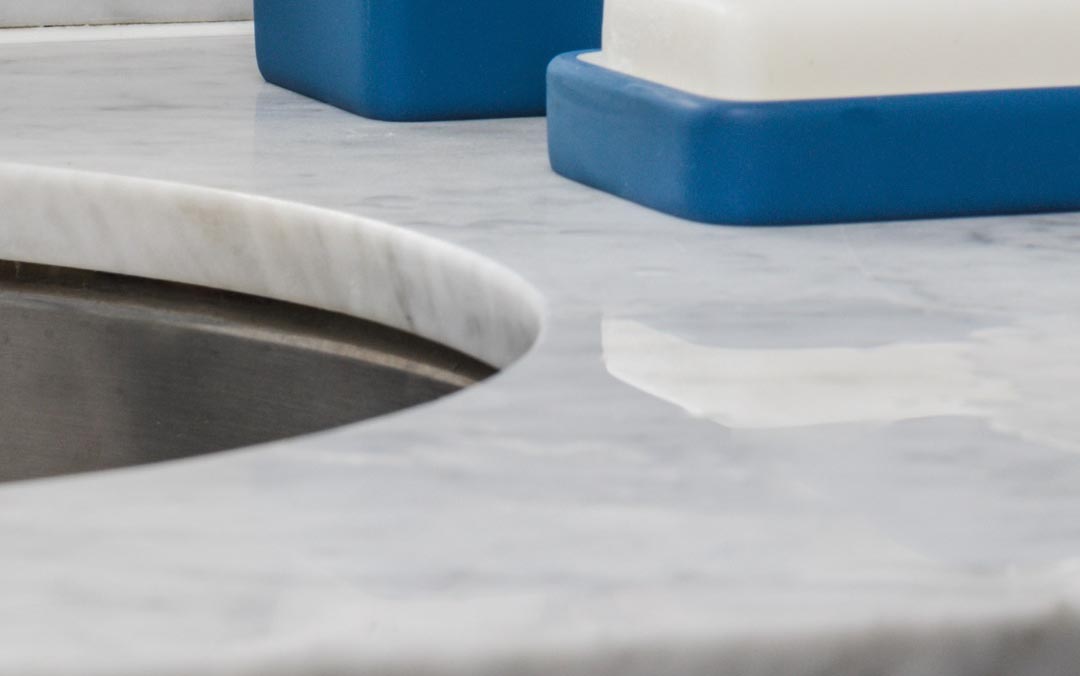
Pros:
- Unique aesthetic - each piece of marble is one-of-a-kind, contributing to a distinctive look
- Heat resistance - it remains relatively cool, making it comfortable underfoot
- Durability - with proper care, marble can withstand the test of time
Cons:
- Water resistance - marble is prone to staining due to its porous nature, so proper sealing is essential
- Cost - tends to be more expensive than other materials
- Maintenance - requires diligent maintenance (regular gentle cleaning, re-sealing and professional polishing)
- Installation - may be more difficult to install to make sure you have a visually appealing vein pattern
Quartz
A good alternative to marble with its aesthetic versatility and durability. Quartz can be costly compared to other alternatives, however it is cheaper than marble and its non-porous surface makes it low maintenance.
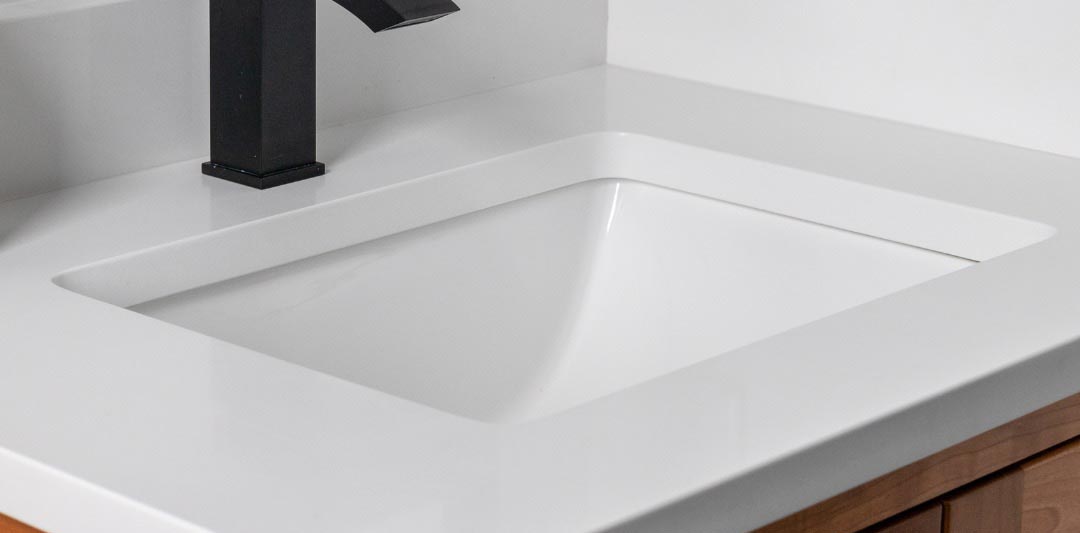
Pros:
- Water resistance - Quartz is highly resistant to stains and bacterial growth, thanks to its non-porous surface
- Variety - available in a wide range of colours and patterns, providing versatile design options
- Low maintenance - requires minimal upkeep, as it does not need to be sealed
Cons:
- Heat resistance - Quartz can be less tolerant to high temperatures compared to other materials though that shouldn’t be a problem in a bathroom!
- Cost - while more affordable than some natural stones, it is generally more expensive than ceramic or porcelain
Natural Stone
Prized for its unique aesthetic, durability, and heat resistance. Natural stone does however present challenges such as regular sealing for water resistance, varying costs, and installation complexities.
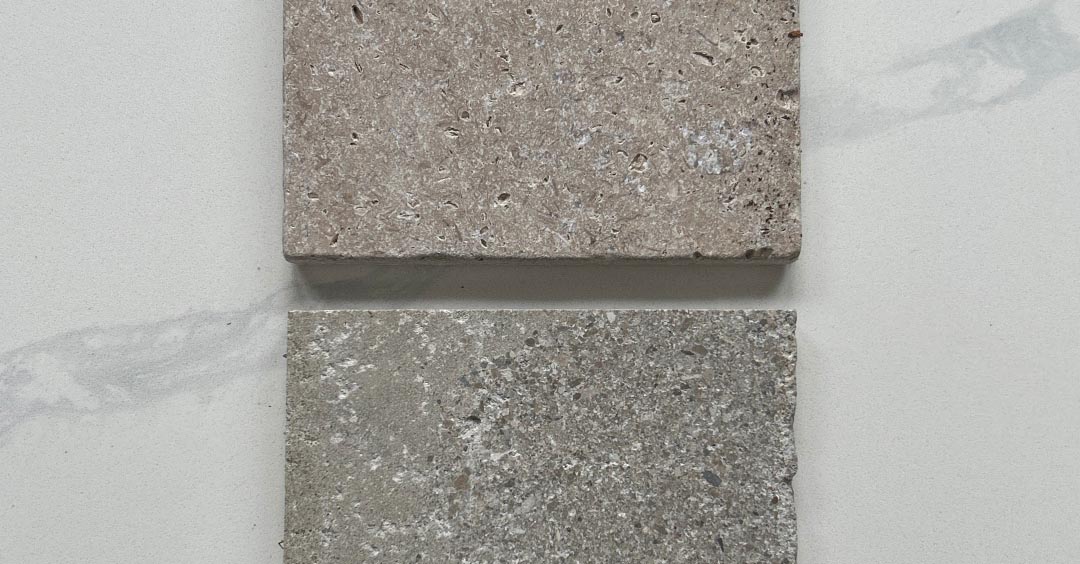
Pros:
- Unique aesthetic - each piece of natural stone is one-of-a-kind, contributing to a distinctive and natural look
- Durability - depending on the type, natural stone can be highly durable; for example, granite, slate and limestone
- Heat resistant - it remains relatively cool, making it comfortable underfoot and can resist high temperatures as it’s a natural stone
Cons:
- Water resistance - like marble, natural stone requires regular sealing to prevent stains
- Cost - the price can vary significantly based on the type of stone
- Installation - installing natural stone may require professional expertise to make sure that the underlying surface is appropriate, the correct adhesive is used, and specialised tools might be needed to cut and shape the stone
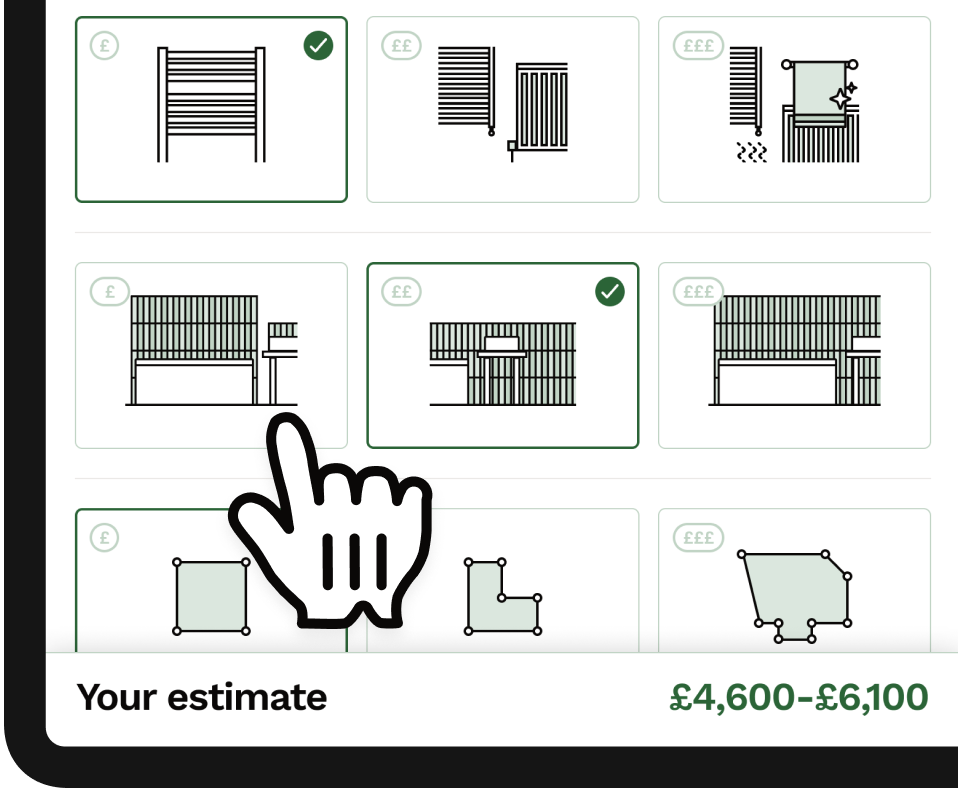
Porcelain
Praised for its inherent water resistance, versatile design options, and durability, porcelain is particularly hard so more difficult to cut during installation and unforgiving to any brittle items dropped on it.
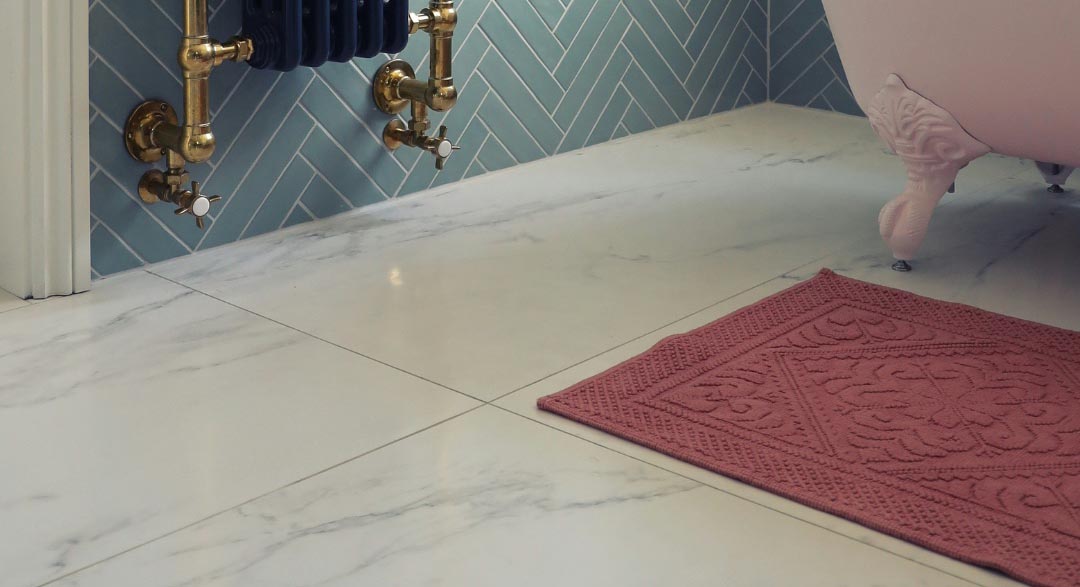
Pros:
- Water resistance - porcelain is inherently water-resistant, making it an ideal choice for bathrooms
- Versatility - available in various colours, patterns, and finishes to suit different styles
- Durability - porcelain tiles are made from highly refined clay that is fired at a very high temperature, making it very hard wearing and long lasting and particularly suitable for floors
- Low maintenance- easy to clean and care for
Cons:
- Durability (again) - while its hardness is an advantage, it can be less forgiving on dropped items. It also makes it more difficult to cut through than other materials
Terracotta
Admired for its warm tones, eco-friendly nature, and customisation potential, terracotta is porous so needs regular sealing and has a tendency to chip or crack easily.
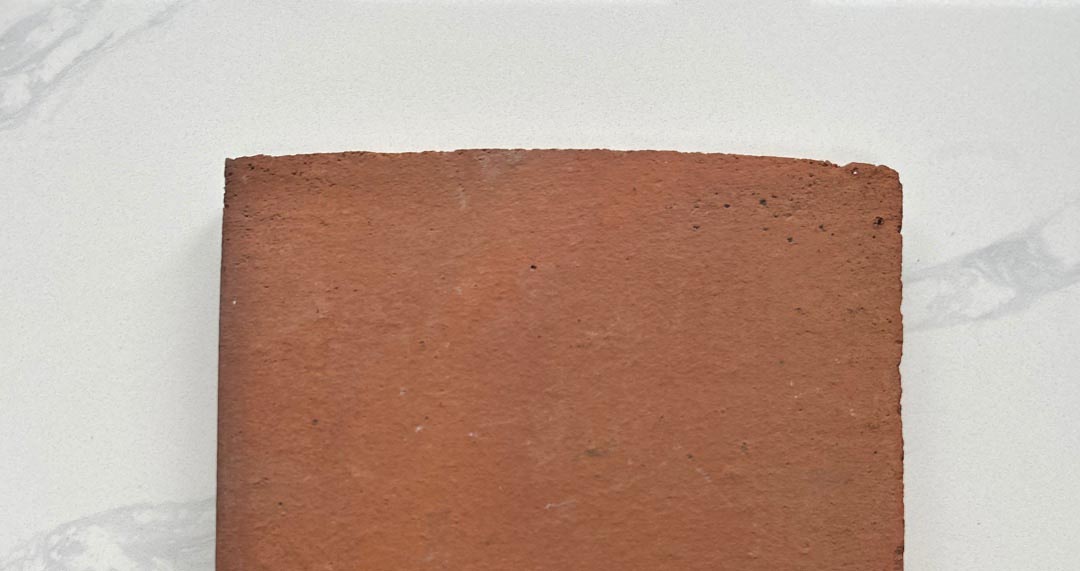
Pros:
- Warmth - terracotta adds warmth to the bathroom with its earthy tones
- Eco-Friendly - made from natural clay, it is an environmentally friendly option
- Versatility - can be customised with various shapes and sizes
Cons:
- Water resistance - like other natural materials, terracotta is porous and needs regular sealing
- Durability - can chip or crack more easily than some other materials
Ceramic
Standing out for its affordability, low maintenance, and design versatility, ceramic has durability concerns like with porcelain, being hard and less forgiving on dropped items.
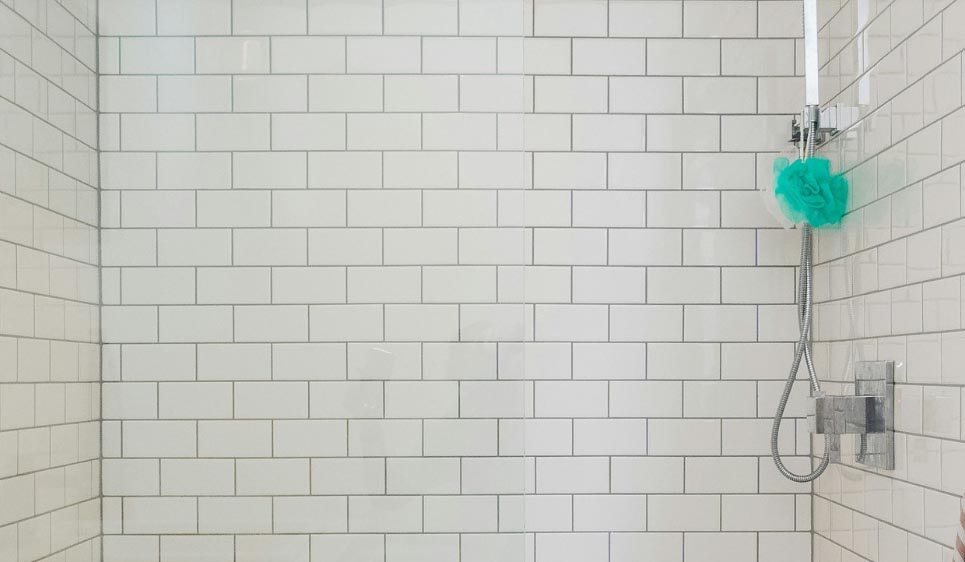
Pros:
- Affordability - ceramic is one of the most cost-effective options
- Low maintenance - easy to clean and maintain
- Versatile - available in various colours, patterns, and sizes
Cons:
- Durability - like porcelain, ceramic can be hard and less forgiving on dropped items
Encaustic Cement tile
Encaustic cement tiles are handcrafted tiles made from a mixture of cement, sand, and pigments.
Unlike ceramic tiles, where the pattern is on the surface, the design of encaustic cement tiles is created by pressing different coloured pigments into the body of the tile. This process results in a distinctive and visually appealing pattern that extends through the thickness of the tile.
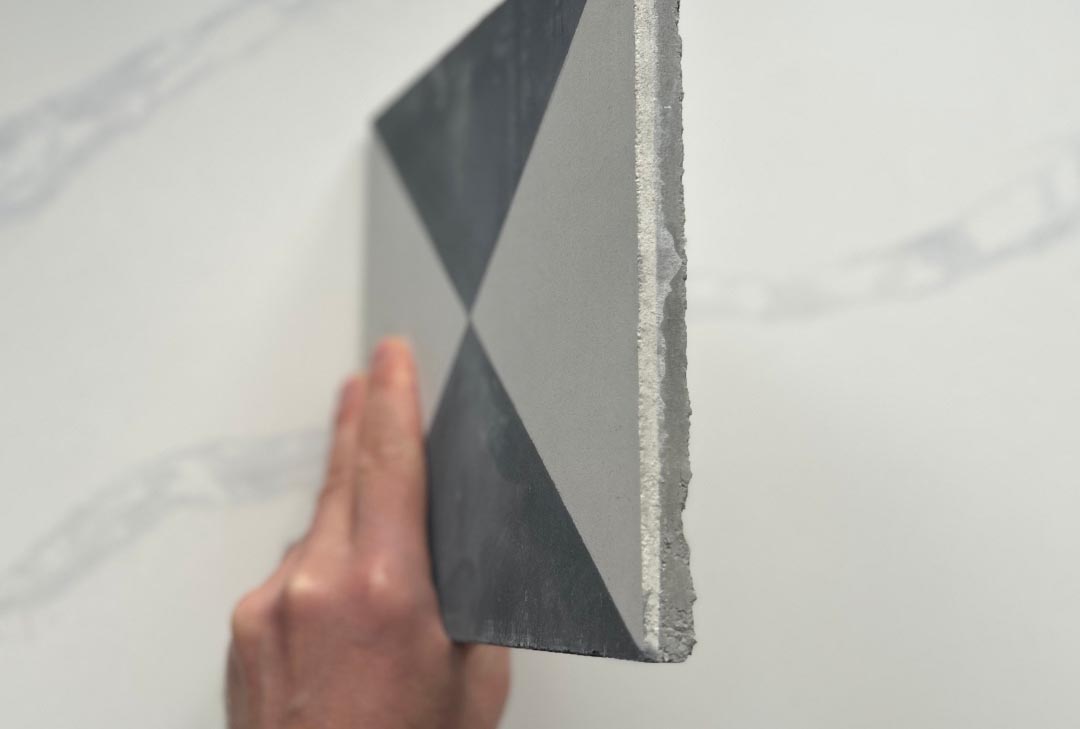
Pros:
- Handcrafted aesthetic - contributing to a unique, artisanal look
- Durability - when properly sealed, these tiles are resistant to wear and can withstand heavy foot traffic
- Environmentally friendly - made from natural materials
- Comfort - stay cool underfoot
Cons:
- Water resistance - porous, making them prone to staining. Proper sealing is essential to protect against moisture and spills. Sealing also requires maintenance over time
- Installation - relatively heavy, which may necessitate additional structural considerations, especially for wall applications. Inexperienced installers may struggle to achieve a level surface and maintain pattern continuity. Due to their weight and the precision required for installation, encaustic cement tiles are not the most DIY-friendly option!
- Cost - compared to some other flooring options, encaustic cement tiles may have a higher upfront cost. However, their longevity may offset this over time
- Wear and tear - cement tiles may develop a ‘patina’ (change in colour / texture), which can either be appreciated for its character or considered a disadvantage
Zellige tile
Zellige tiles are a form of glazed ceramic or terracotta tile originating from the Moroccan tradition. They are handcrafted using a unique process that involves shaping, firing, and then glazing the tiles.
The glazing process imparts a glossy and irregular finish. Zellige tiles are known for their vibrant colours, uneven surfaces, and the way they reflect light.
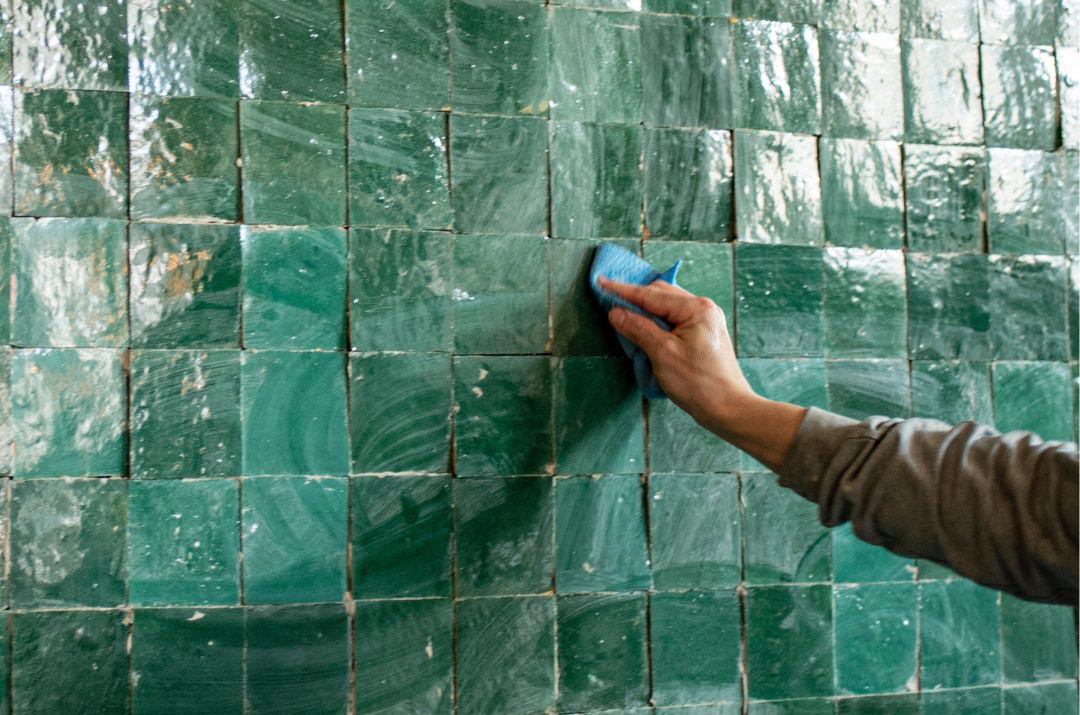
Pros:
- Handcrafted aesthetic - offer a distinct look with their handcrafted, irregular shapes, and glossy finish that reflects light in a unique way
- Comfort - stay cool underfoot
Cons:
- Installation - variations in size, irregular shapes and thickness may pose challenges during installation so worth discussing ahead of time
- Durability - surface can be relatively soft compared to some other ceramics, making them more susceptible to wear and chipping
- Maintenance - may require regular sealing to protect the glaze, best to check!
- Cost - higher price tag compared to more mass-produced ceramic tiles
Linoleum
Linoleum is a resilient flooring material made from natural components such as linseed oil, cork dust, wood flour, and pigments.
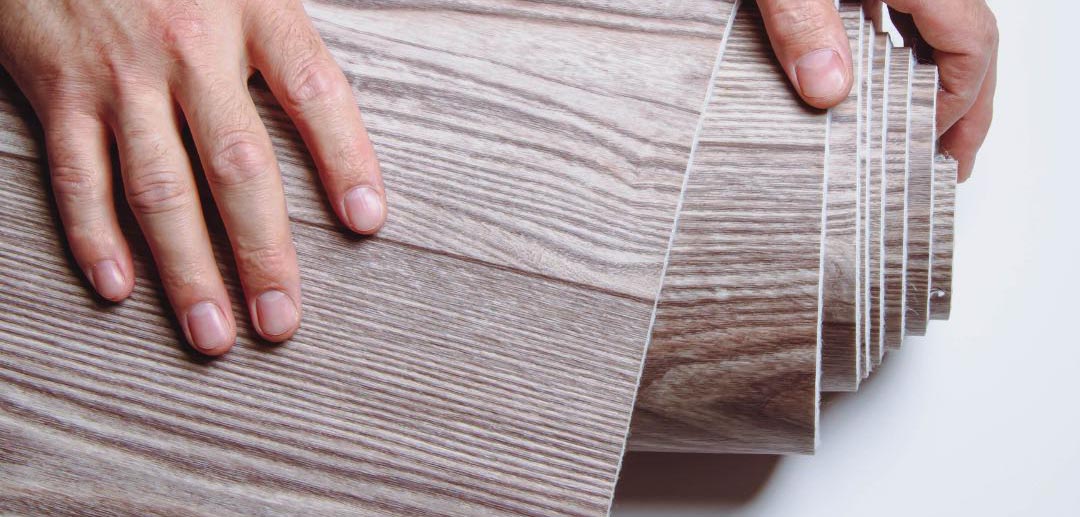
Pros:
- Water resistant - naturally resistant to water
- Durable - resistant to scratches and dents
- Eco-friendly - linoleum is made from natural materials, making it an environmentally friendly choice
- Low maintenance - easy to clean and requires minimal maintenance
- Comfortable - softer feel underfoot compared to some other hard flooring options
Cons:
- Can be tricky to install
- Can fade over time if exposed to sunlight
Cork
Cork flooring is crafted from the bark of cork oak trees. The bark is harvested without harming the tree, making cork an environmentally sustainable material.
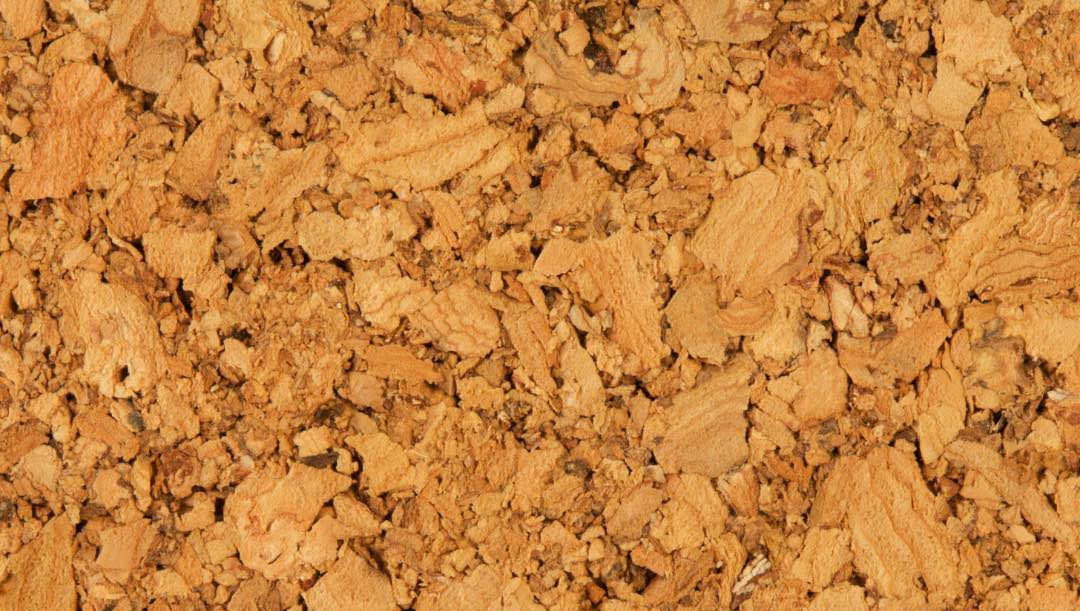
Pros:
- Water resistant - cork is naturally resistant to water to some extent
- Comfortable - soft and warm underfoot
- Eco-friendly - like linoleum, cork is considered an environmentally friendly option
- Mould and mildew resistance - naturally resistant to mould and mildew
- Sound absorption - cork has excellent sound-absorbing qualities
Cons:
- Sealing required - cork needs to be properly sealed to prevent water damage
- Not as durable - cork can be more susceptible to damage from heavy objects or sharp items
- Design- design options somewhat limited compared to other materials
Bamboo
Bamboo flooring is made from the fast-growing bamboo plant, which is a renewable resource. Bamboo is harvested and processed into planks for flooring.
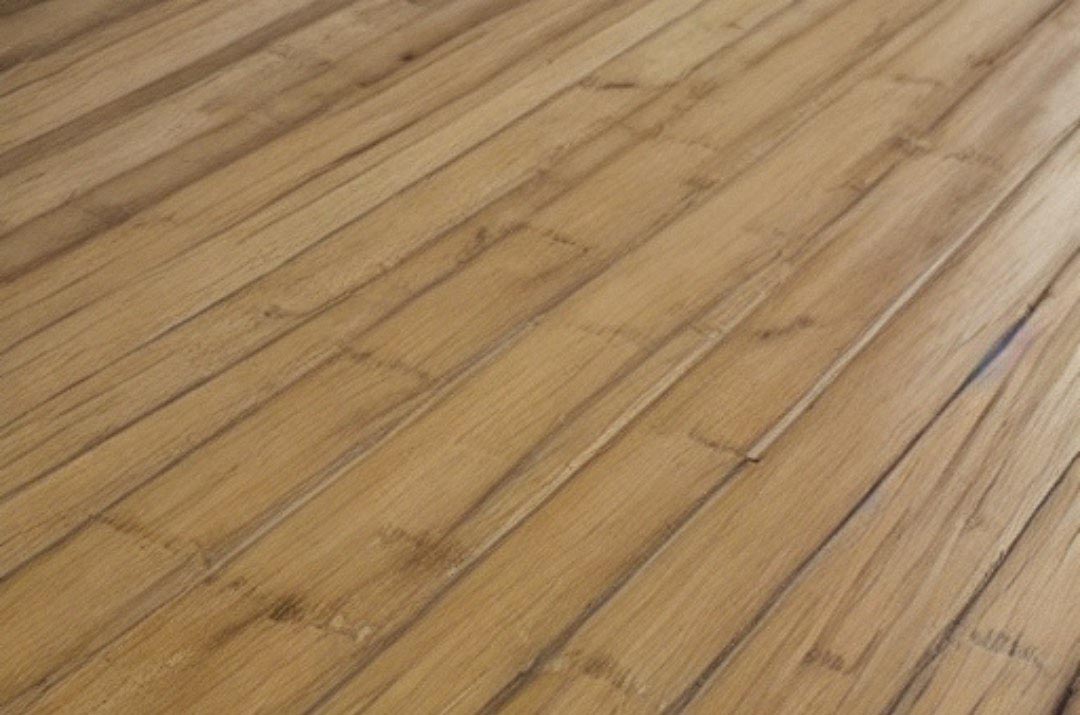
Pros:
- Sustainability - bamboo is a rapidly renewable resource, making it an eco-friendly choice
- Water resistant - bamboo has natural water-resistant properties
- Durability - durable and resistant to scratches and dents
- Easy maintenance - easy to clean and maintain
Cons:
- Sensitivity to humidity - bamboo can be sensitive to changes in humidity
- Cost - high-quality bamboo flooring can be relatively expensive
- Limited repair options - if damaged, bamboo can be challenging to repair compared to some other flooring options
You should also consider the weight of the material used. Stone, marble and porcelain tend to be particularly heavy, although this depends on the thickness chosen. You might need to check the structural integrity of the wall or floor to make sure it can handle the additional weight, and consider how the material will get into the bathroom – you might need an extra pair of hands!
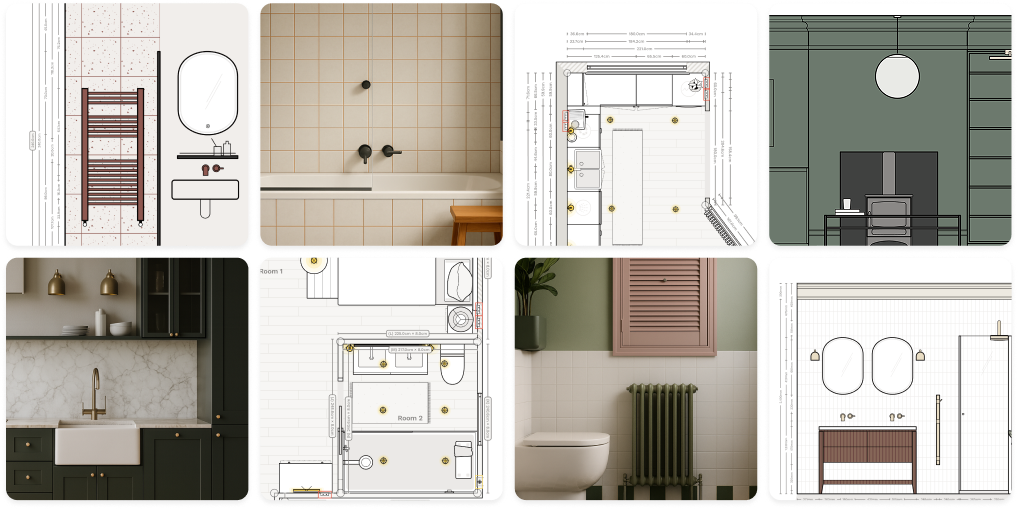
Frequently asked questions
What is the most durable surface material for a bathroom?
Porcelain and natural stone are among the most durable bathroom surface materials. Porcelain is highly resistant to water, stains, and scratches, making it ideal for flooring and walls. Natural stone, such as granite or slate, is also extremely durable but requires sealing to maintain its water resistance.
What is the best low-maintenance material for bathroom surfaces?
Quartz and porcelain are the best low-maintenance options for bathroom surfaces. Quartz is non-porous, so it resists stains and bacteria without needing sealing. Porcelain is also water-resistant and easy to clean, making both materials great choices for hassle-free bathroom upkeep.
Which eco-friendly materials are best for bathroom surfaces?
Eco-friendly bathroom surface materials include linoleum, cork, and bamboo. Linoleum is made from natural, biodegradable components, cork is harvested sustainably without damaging trees, and bamboo is a fast-growing renewable resource. These materials offer a balance of sustainability and practicality.
Which bathroom surface material is the easiest to install?
Ceramic and porcelain tiles are relatively easy to install, especially for DIY projects, as they come in standard sizes and require minimal sealing. Linoleum and cork flooring are also straightforward to fit, making them great choices for a quick bathroom update.
What is the most cost-effective material for bathroom surfaces?
Ceramic tiles and linoleum are among the most budget-friendly bathroom surface materials. Ceramic tiles offer a balance of affordability and durability, while linoleum is an eco-friendly and low-maintenance option at a lower price point than stone or quartz.
Renovating? Read more...
Bathroom
On-trend ways to tile bathrooms
2 on-trend ways to tile bathrooms, chosen by an interiors editor for how luxe they look
Bathroom
How to create a spa bathroom even in a small space
Peace might come from within, but it's certainly helped if your immediate surroundings are calm and collected.
Bathroom
Top green and energy saving tips for bathroom renovations
A quick summary from the Energy Saving Trust, published February 2023
Bathroom
Where to start planning a new bathroom
Where is the to do list? What should I work out first, what comes later?
Bathroom
How do I find the best bathroom layout for my space
Here's a pro tip: start with the toilet. Why? Because it's the one fixture that's hardest to move.
Free tools to get started

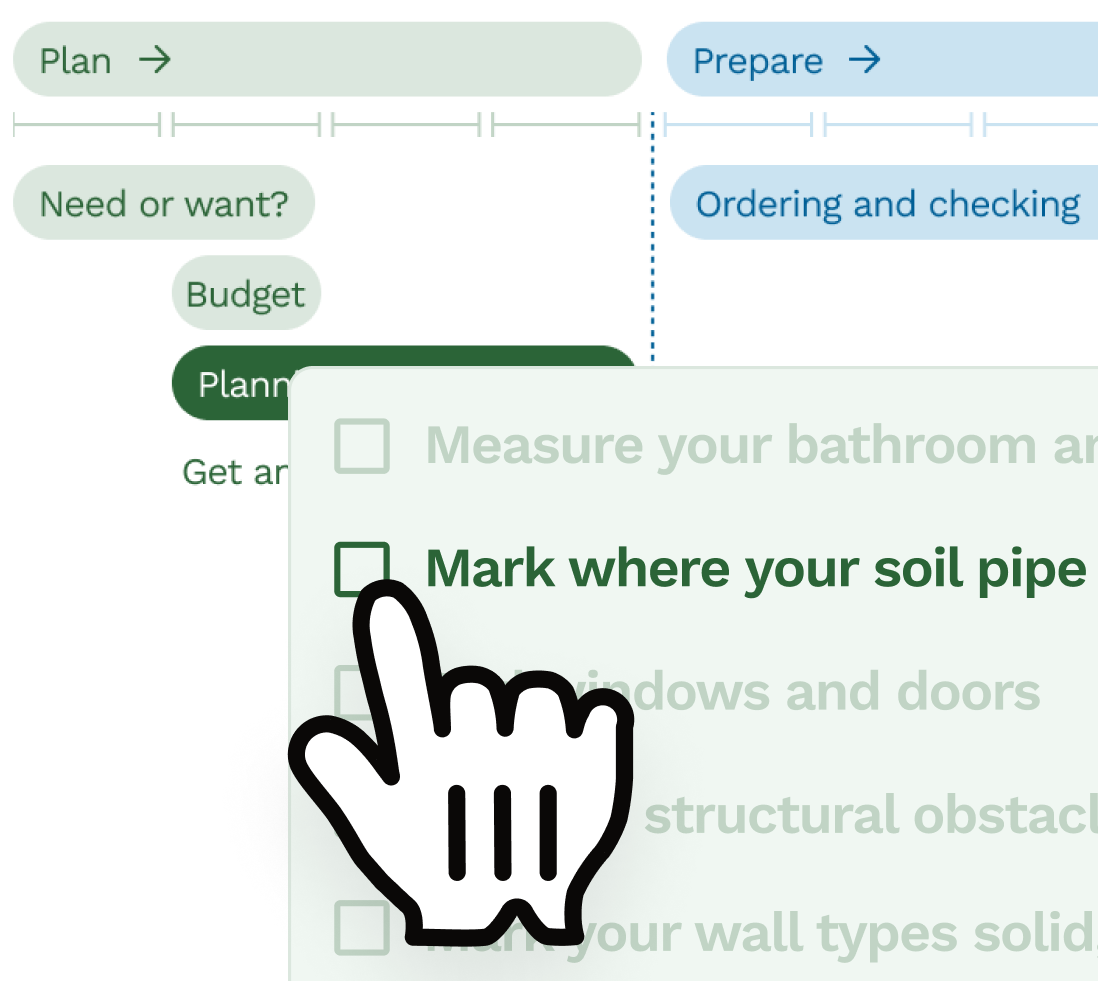
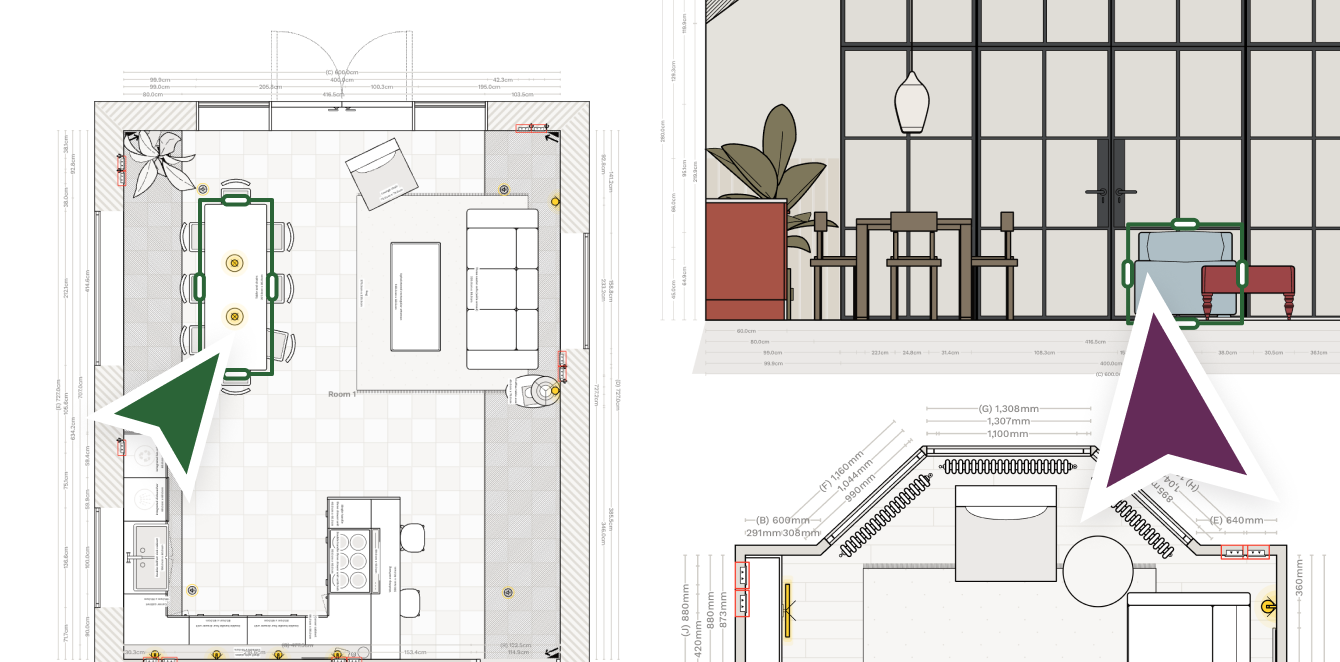

Start your renovation with Reno